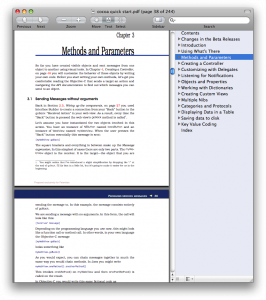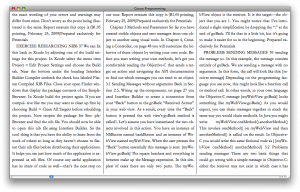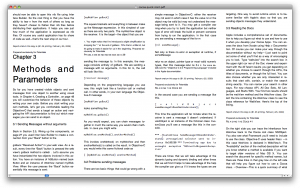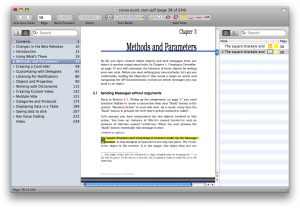Whenever I write something, from tweets to blog posts, I re-post it to Facebook. My 900-or-so friends are very inclined to comment and reply there. Many of these friends are from the "real" world, but several are not. Most of the people who comment, I notice, are those whom I have met.
In response to my eBook reader review, I got some discussion. One comment in particular drew me to want to write a longer post.
Adam McKercher (I went to school with him) wrote a comment:
I don't know how you [...] keep up with all the "If Only" aspects of computer culture, the vastness and need for improvement, and constant revision is what ultimately lead me to change majors.
I have to say, being in a business like this requires you to be able to look through a telescope, binoculars, bifocals and a magnifying glass, sometimes in the same sentence. Keeping yourself sane while doing so is... an exercise in the power of the human brain. I'm actually hoping to do less "microscope" level work in the future. I really like following trends and making recommendations based on my knowledge of some sort of understanding of the eco-system.
At the same time, when I talk about following trends, it's difficult to draw a hard line between watching trends and keeping up with the Joneses. If you pay too much attention to what everyone else is doing, it will end up influencing your medium-term decisions, and most critically, your day-to-day work.
A former manager of mine had this illness: the "me-too" illness. My coworkers and I started calling it "chasing the bunny", like a greyhound on the racetrack. We would be hard at work on something that we were told to do the previous week, and then we would get these mixed messages from our manager. Once we learned to ignore it, things were OK, we were able to focus on work. However, now we were used to ignoring our manager. This tells me that chasing the bunny is not a good management style. The environment we had was not agile enough to be able to make these changes in direction very easily.
I guess a really easy way to avoid this is to have a great mission statement for your business or product, and create a very clear vision - the place you want to reach in 3, 5 or even 25 years. If you know where you're headed, you won't be prone to rubbernecking at your competition while you should be keeping your eyes on the road.
![Blue Ocean Strategy Blue Ocean Strategy]()
 This idea is not completely mine (at least not lately). I've been reading a killer book on a recommendation from Mike. The subtitle of this book is "How to Create Uncontested Market Space and Make Competition Irrelevant". Basically, their advice tells you to look at the competition, and "zag" where they "zig". Instead of directly competing, try removing from your product three things that they claim are important, and add a few things that they're not even thinking about.
This idea is not completely mine (at least not lately). I've been reading a killer book on a recommendation from Mike. The subtitle of this book is "How to Create Uncontested Market Space and Make Competition Irrelevant". Basically, their advice tells you to look at the competition, and "zag" where they "zig". Instead of directly competing, try removing from your product three things that they claim are important, and add a few things that they're not even thinking about.
In the case of 37 Signals' Basecamp, they may have just taken out those three things and stopped. I'd love to see the 4-square Strategy Canvas for any 37 Signals product. Maybe I'll have to blog about this one later.
The book itself was written in 2004, so their case studies are a bit dated - similar to how reading The Long Tail (which was written pre-YouTube), kind of feels like it's missing the boat on the biggest long-tail product of the decade.
(which was written pre-YouTube), kind of feels like it's missing the boat on the biggest long-tail product of the decade.
At the same time, if you're any good at abstraction, you can take the case studies in these books, extrapolate a bit, and come up with a decent picture of what the author(s) might have said, had they gotten an extra 6 or 7 years to write the book. Maybe that's the best argument ever to create "living" books, like the Complete Guide to Google Wave. When you're writing about something that changes almost daily, how do you reach the point when you can say, "this is the most complete picture of this concept". I read earlier this week about a fancy kind of publication called a Monograph. What a very old-world concept. Very pretentious. Very wrong.
How much do you follow trends, and consciously let those trends effect your work? Would you rather just stop reading raw, real-time messages, and only consume "dead tree" media, allowing time for the message to slowly drip into your train of thought? Do you have a system for absorbing this stuff at all?
, I recognize the book as a brand around the idea of these "sticky" concepts. Here is a neat video re-posted from Fast Company with one of the authors of Made to Stick.




